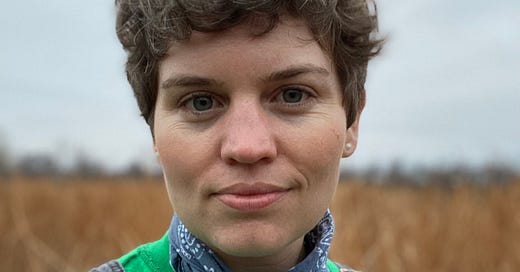Mississippi Transplant: Lauren Rhoades
"Here I am nearly ten years later, with a Mississippi dog, a Mississippi house, a Mississippi husband, and a Mississippi baby in tow."
What does it mean to call Mississippi home? Why do people choose to leave or live in this weird, wonderful, and sometimes infuriating place? Today Rooted Magazine founder and editor-in-chief Lauren Rhoades takes her own questionnaire.
Where are you from?
Denver (and suburbs of Denver), Colorado
When did you move to Mississippi and why did you move here?
I moved to Jackson in August, 2013 to work with FoodCorps as an AmeriCorps service member. Before moving to Jackson, I had never been to the Deep South. I had never eaten fried okra, or crawfish, or turnip greens. I was 24 and ready for an adventure, and boy did I get one. I thought I’d live in Mississippi for at least two years, maybe five. Here I am nearly ten years later, with a Mississippi dog, a Mississippi house, a Mississippi husband, and a Mississippi baby in tow.
The daily scaffolding of my life is intertwined with this place, and what more is a sign of home than the ordinariness of routine and familiarity?
What does “home” mean to you? How does Mississippi fit into that definition?
Throughout my life, I’ve felt like a hermit crab looking for its perfect-fitting shell, never quite able to settle in, stay in one place. For as long as I remember, I knew I would leave the place where I grew up. It’s not that I didn’t like Colorado—I have great memories of camping and ski trips, hiking the Boulder Flatirons between college classes, and seeing the Milky Way from my grandfather’s home in the San Luis Valley. But I also wanted to see other places, try on other shells. Neither of my parents are from Colorado, which perhaps instilled in me the idea that home is a place you choose for yourself, not the place where you are born.
For years, though, “home” was wherever my mother and stepfather were. I knew I could always return home to them if I really needed to, even when they moved from Denver to D.C. As much as I enjoyed the thrill of exploring unfamiliar territory far from family, I still had the security of knowing there was a safe place waiting for me. For many years I took that security for granted. I understand now what a privilege that was.
At this phase of my life, “home” carries with it a feeling of greater responsibility and intentionality. Home is the partnership I have with my husband, the space of love and safety we’ve built for each other and for our daughter. Home is our little cinder block ranch beneath a towering oak tree, our neighborhood in Northwest Jackson, which once was primarily white, and now, in the wake of white flight, is primarily Black, filled with young families and a sprinkling of older homeowners whose yards are always pristinely mowed. Home is my garden, which is ever changing, haphazard, filled with perennials, old roses, bulbs, and hardy propagates.
Still, I get restless. The concept of a “forever home” eludes me. I envy people who have that sense of surety.
Jackson is my home, too. I became an adult in this city, started a career and made lifelong friends, got married, gave birth here. My dentist and my doctor are in Jackson, my dog’s veterinarian, my daughter’s daycare. The daily scaffolding of my life is intertwined with this place, and what more is a sign of home than the ordinariness of routine and familiarity?
Still, I get restless. The concept of a “forever home” eludes me. I envy people who have that sense of surety.
Keep reading with a 7-day free trial
Subscribe to Rooted Magazine to keep reading this post and get 7 days of free access to the full post archives.





